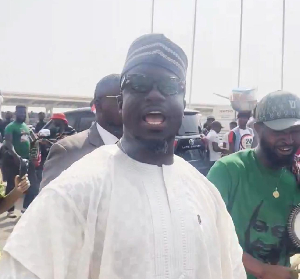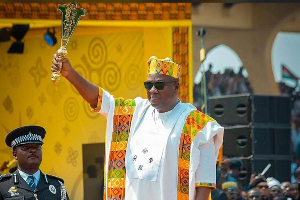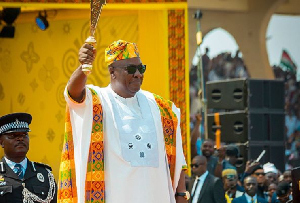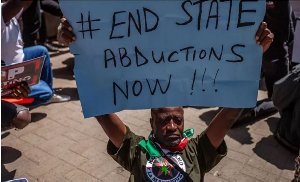President Kufuor has broken his silence. At the weekend's NPP fundraising event in the Okai Koi North, President Kufuor reportedly said that he was going to stay neutral in the contest to elect the party's presidential candidate for the 2008 elections. Several newspapers, including this paper, carried the story.
At The Statesman, we still stand by our view that the President is free to have a preference. However, our point has been that Kufuor should not unduly influence party officials and delegates to support his candidate of choice. So, we welcome the statement that the President has no preference. We are quick to add, however, that the assurance in his statement to the party will be most felt in deeds rather than in words. We hope the entire party, and even concerned neutrals, will be comforted by the words of the President.
Now, what does the President intend to do about those who are said to be bandying his name about? Are they going to be brought to order? Even if not brought to order, we are urging party members and other key players such as DCEs to stand up against any aspirant or his camp for presidential name-dropping.
Ironically, last Thursday, a group calling itself the Western Regional Youth Campaign Team of one of the candidates held a press conference and was reported as saying that the team did not only see nothing wrong with the President supporting a particular candidate but that the President had "undoubtedly" seen their candidate as the one capable of building on the good national foundation laid by the incumbent.
The President himself has said loudly and clearly that he has no candidate, so whoever claims presidential endorsement must be shunned. We hasten to add, even if the President’s clone comes pushing for support to a particular candidate, they should remind him of what was said at Okai Koi North. With Nelson Mandela entering his twilight years, Africa is in search of credible leaders. Obasanjo stood a great chance of being one such leader, but getting to the last moments of his tenure, he took an active interest in soiling his democratic credentials. First, he handpicked a candidate and then he actively worked against his Vice President.
This leaves the top African statesman role wide open for Presidents Kufuor and Mbeki to fill once they leave office. President Kufuor, The Statesman predicts, will be bigger than ever once he leaves office.
From 2009, he will become an asset for the entire continent. Unlike some of those who retired before him, Kufuor is positioned to become the leader of an extraordinary class of African heads of state. This class of leaders will have left office with unblemished records of democratic credentials and will have the legitimate right to lead the continent’s journey towards development, integration, etc.
Kufuor cannot afford to sully the excellent reputation he has built for himself, his party, country and continent in international circles on a matter that is merely intra-party. Indeed, it is not for nothing that framers of the NPP constitution designed the primary process in such a way that the delegates who choose the presidential candidate are by and large the rank and file. The President, Ministers, Parliamentarians, National Officers and Regional Officers all have no automatic right as delegates. That right is reserved to four of the ten constituency officers, who have to be chosen by an extraordinary constituency congress, with polling officers being eligible as delegates.
The majority of the 10 delegates from every constituency (numbering six) are chosen from the party at large, with every member in good standing, whether MP or an ordinary member. All are entitled to put themselves forward as delegates. Clearly, the framers of the NPP constitution must have reasoned that because the actual door-to-door canvassing is done by the rank and file of the party, it would be unhelpful to impose a candidate from above. The rank and file must feel 'ownership’ of the candidate.
The candidate must be a person they believe they can support; one that they will freely market and with a strong sense of confidence. That must be why they are given the majority role in selecting candidates.
The campaign is just about to get hot. But, the party has enough decency to keep the contest clean. The president should be a referee. He should not have a problem if one of the Ministers he fired is chosen as the flag-bearer eventually. Why should he have a problem holding the hand of such a candidate? Why should he have a problem helping to market him if—in the party’s wisdom—that is the man to succeed him after 2008. The beauty of democracy is to accept the choice of the majority—and live with it.
















